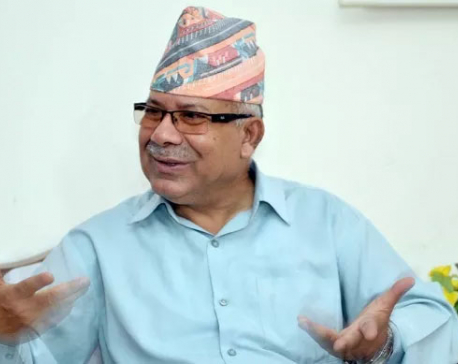
OR
Resource mobilization key challenge for federal Nepal, say experts
Published On: December 20, 2017 02:45 AM NPT By: Republica | @RepublicaNepal
KATHMANDU, Dec 20: Experts and senior government officials have said that fiscal federalism is going to become the biggest challenge in the coming days as the transition to the new system will come at a massive cost.
Speaking at a national seminar on 'Fiscal Challenges in Federal Nepal' organized by Society of Economic Journalists (SEJON) in Kathmandu on Tuesday, they, however, said that federalism can propel economic growth if managed in a prudent manner.
“With the implementation of federalism, budget volume of the central government will also increase,” Shanta Raj Subedi, former secretary of the Ministry of Finance said, presenting a paper on 'Fiscal Challenges in Federal Nepal'.
While the central government has to share its revenue including Value Added Tax (VAT) and excise duty with sub-national entities, it will also have to transfer various grants to them.
“Even with the 22 percent of annual average revenue growth, our resource is going to be squeezed,” added Subedi.
According to Subedi, the government has not been able to utilize foreign grants while domestic debt cannot be raised at once despite having enough space for internal borrowing.
“Provinces are going to face resource crunch for at least two or three years and the central government should bear that liabilities. The central government also cannot reduce the number of grants to local units,” said Subedi.
He also suggested broadening the tax net, curbing revenue leakages and increasing tax compliance to address the problem shortage of resources.
However, Finance Secretary Shankar Adhikari contended that the overall administrative cost is likely to go down in the federal system. “The administrative or recurrent expenditures will increase for a maximum of three years. But as the number of cost centers will go down in the federal set up, the administrative cost will also be reduced,” said Adhikari.
“We should not be scared of the notion that federalism is going to be too costly for us. Instead, the expenditure is likely to go down significantly when the number of spending units falls drastically,” he added, estimating that existing 3,500 'cost centers' will reduce to around 2,000.
According to Adhikari, foreign direct investment (FDI) should be attracted in the country to tackle shortage of resources. He also said that the project selection and allocation of budget at the sub-national levels should be undertaken with a need-based approach.
“It's true that the fiscal responsibility and liability of the government is going to increase in the federal system. It may be challenging, but not impossible,” said Adhikari. “With the stable government in place, we will have the environment conducive for investment. It will boost revenue buoyancy,” he added.
Also speaking at the event, Yubaraj Khatiwada, former vice president of National Planning Commission, said that both the revenues and liabilities should be gradually assigned to sub-national governments. “We have a lot of fiscal space. We can utilize it for propelling economic growth,” Khatiwada, who is also a former governor of the Nepal Rastra Bank, added.
Kantika Sejuwal, the mayor of Chandannath Municipality of Jumla, lamented that the central government has discriminated Jumla in fiscal transfer. “The budget allocation of budget is uneven and the fiscal transfer made to our municipality is very low,” she said, vowing to utilize local resources and reducing dependency on central government for fiscal grants.
CALL TO PREPARE COST NEEDS ASSESSMENT
Meanwhile, former finance secretary Subedi also urged the government to carry out needs assessment of operational and infrastructure cost in the federal set up.
Though finance ministry officials have put the estimated Rs 820 billion as an immediate cost for setting up necessary infrastructure and operationalize federalism, there has not been any assessment of such cost.
“We have not carried out any scientific assessment yet on how much liability is there and how much resources we need,” said Subedi. “We can find the resources only if we have scientific needs assessment,” he added.
You May Like This

King's College partners with Demola
KATHMANDU, Aug 15: Experts and business leaders have said that Nepal's global trade is suffering due to lack of product... Read More...

Party's name will be Nepal Communist Party after merger: Leader Nepal
KAILALI, Feb 9: CPN-UML leader Madhav Kumar Nepal said that the name of the new party after merger between CPN-UMLand... Read More...

Nepal elected chair of LDC Experts' Committee under climate change convention
KATHMANDU, Feb 6: Nepal has been elected as the chair of the Experts' Committee of Least Developed Countries under the climate... Read More...




Just In
- Health ministry to conduct ‘search and vaccinate’ campaign on May 13
- Indian customs releases trucks carrying Nepali tea, halted across Kakarbhitta
- Silent period for by-election to begin from midnight
- SC issues short-term interim order to govt and TU not to take immediate action against TU legal advisor Khanal
- National consultation workshop advocates to scale up nutrition smart community in Nepal
- Patan High Court issues short-term interim order to halt selection process of NTB’s CEO
- NEPSE inches up 0.15 points; daily turnover increases to Rs 2.53 billion
- Bagmati Govt mandates tri-lingual signboards in offices














Leave A Comment